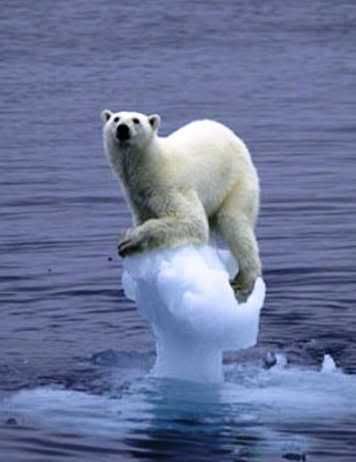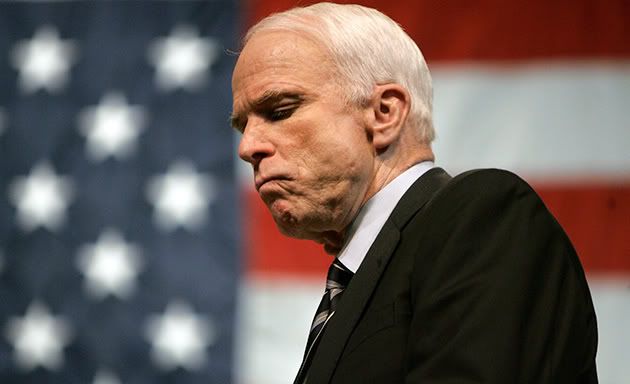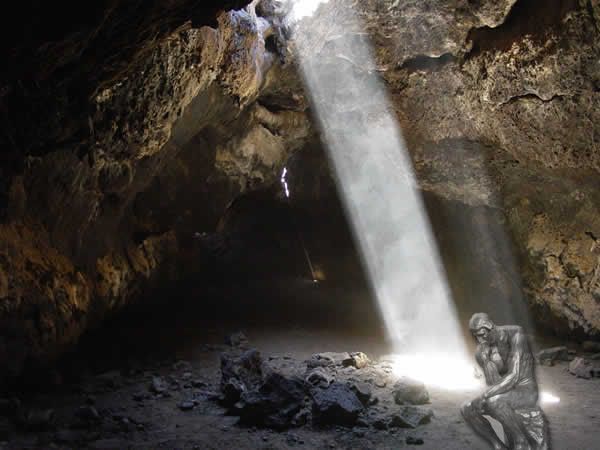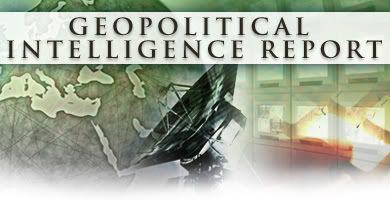Author's posts
Aug 24 2008
More Hot Air?

The first questions I asked when I came to Docudharma for the first time last October 2007 were…
Are we at the beginning of the end?
Or are we at The End Of The Beginning?
Billmon in September of [2006] posted a story about
British scientist James Lovelock and his warning that catastrophic global climate change is both imminent and unstoppable:
Within the next decade or two, Lovelock forecasts, Gaia will hike her thermostat by at least 10 degrees. Earth, he predicts, will be hotter than at any time since the Eocene Age 55 million years ago, when crocodiles swam in the Arctic Ocean.
“There’s no realization of how quickly and irreversibly the planet is changing,” Lovelock says. “Maybe 200 million people will migrate close to the Arctic and survive this. Even if we took extraordinary steps, it would take the world 1,000 years to recover.”
It would be easy to view this as just another kooky end-of-the-world theory, if it weren’t for the history of some of Lovelock’s other kooky theories — like the time in the late ’70s when he hypothesized that chlorofluorocarbons wafted high into the stratosphere would eat great big holes in the ozone layer, exposing first the polar regions and then the rest of the earth’s surface to increasingly harmful ultraviolet radiation. What a nut.
As far as I can tell, Lovelock’s latest crackpot (or should I say “crockpot”?) idea is still the minority opinion among climatologists, most of whom seem to believe we have perhaps 70-100 years before the seriously disastrous greenhouse effects kick in — although Jim Hansen, the NASA scientist, has suggested that unless major cuts in Co2 emissions are made within the next decade, the process will become every bit as irreversible as Lovelock claims it already is.
If we break it, if we disrupt its integrity, we die. We die. It is as simple as that.
It now appears that we are on the verge of breaking it, if we have not already done so. It is my hope that we haven’t yet, but also my opinion that we are dangerously close to doing so. So close in fact that there is no more time to waste. The next year or two may very well be the turning point, if we have not already passed it.
Many say that security of the nation is most important because without it nothing else can happen.
Our environment, our entire world, is immeasurably larger, and the problems we face are immeasurably larger than national security in the context of the arguments about it over the past few years.
Nations cannot and will not exist if the planet is killed.
Our backs are to the wall this time. We are painted into the proverbial corner. There is no escaping it. There is only life, or death, for all of us. We have only ourselves to fault, and only ourselves to rely on. No invisible being is going to come down from the sky and save us from ourselves.
Aug 23 2008
McCain’s Call For Help

Operator: ‘Computer help desk; may I help you?’
McCain: ‘Yes, well, I’m having trouble with WordPerfect.’
Operator: ‘What sort of trouble??’
McCain: ‘Well, I was just typing along, and all of a sudden the words went away.’
Operator: ‘Went away?’
McCain: ‘They disappeared.’
Operator: ‘Hmm So what does your screen look like now?’
McCain: ‘Nothing..’
Operator: ‘Nothing??’
McCain: ‘It’s blank; it won’t accept anything when I type.’
Operator: ‘Are you still in WordPerfect, or did you get out??’
McCain: ‘How do I tell?’
Operator: ‘Can you see the C: prompt on the screen??’
McCain: ‘What’s a sea-prompt?’
Operator: ‘Never mind, can you move your cursor around the screen?’
McCain: ‘There isn’t any cursor: I told you, it won’t accept anything I type.’
Operator: ‘Does your monitor have a power indicator??’
McCain: ‘What’s a monitor?
Aug 22 2008
Real News: Full Spectrum Dominance
Pepe Escobar summarizes and contextualizes the transition from the War On Terror hype to a new 21st century cold war scenario that this time around has much more potential to turn hot, as in nuclear hot, than the old style cold war.
Is John McCain the P.T. Barnum of politics? Or the Charlie McCarthy of politics?
August 21, 2008 – 9 min 24 sec
Pepe Escobar: Welcome to the New Cold WarPepe Escobar, born in Brazil is the roving correspondent for Asia Times and an analyst for The Real News Network. He’s been a foreign correspondent since 1985, based in London, Milan, Los Angeles, Paris, Singapore, and Bangkok. Since the late 1990s, he has specialized in covering the arc from the Middle East to Central Asia, including the wars in Afghanistan and Iraq. He has made frequent visits to Iran and is the author of Globalistan and also Red Zone Blues: A Snapshot of Baghdad During the Surge both published by Nimble Books in 2007.
Aug 21 2008
Optimism

Read this… these are two of the cheerful passages in the article.
Then go read the whole thing.
I don’t have a whole lot to say about it, yet. It’s still sort of reverberating around inside my head as I try to come up with something halfway intelligent sounding to say about it… maybe some of you will be able to?
The Delusion Revolution: We’re on the Road to Extinction and in Denial
By Robert Jensen
Aug 15, 2008
Imagine that you are riding comfortably on a sleek train. You look out the window and see that not too far ahead the tracks end abruptly and that the train will derail if it continues moving ahead. You suggest that the train stop immediately and that the passengers go forward on foot. This will require a major shift in everyone’s way of traveling, of course, but it appears to you to be the only realistic option; to continue barreling forward is to court catastrophic consequences. But when you propose this course of action, others who have grown comfortable riding on the train say, “Well, we like the train, and arguing that we should get off is not realistic.”
In the contemporary United States, we are trapped in a similar delusion. We are told that it is “realistic” to capitulate to the absurd idea that the systems in which we live are the only systems possible or acceptable because some people like them and wish them to continue. But what if our current level of First World consumption is exhausting the ecological basis for life? Too bad — the only “realistic” options are those that take that lifestyle as non-negotiable. What if real democracy is not possible in a nation-state with 300 million people? Too bad — the only “realistic” options are those that take this way of organizing a polity as immutable. What if the hierarchies on which our lives are based are producing extreme material deprivation for the oppressed and a kind of dull misery among the privileged? Too bad — the only “realistic” options are those that accept hierarchy as inevitable.
Let me offer a different view of reality: (1) We live in a system that, taken as a whole, is unsustainable, not only over the long haul but in the near term, and (2) unsustainable systems can’t be sustained.
How’s that for a profound theoretical insight? Unsustainable systems can’t be sustained.
[…snip…]
Aug 20 2008
Real News: Dems Onside With Bush On Georgia
Real News CEO Paul Jay continues his interview series with journalist Eric Margolis about the dangerous situation in the Caucasus since the Georgian attacks on South Ossetia, the Russian response, the US Foreign Policy bumbling by Condoleeza Rice backed by the war hawk rhetoric from John McCain, and the announcement of a US missile defense system to be installed in Poland targeting Russia.
Now Barack Obama joins the war hawks.
August 20, 2008 – 5 min 23 sec
Eric Margolis: Is Obama afraid of getting on the wrong side of the ‘patriotic issue’?Eric Margolis: This is not like the Soviet Union and Finland, this is the US trying to stick its nose into Russia’s backyard. The Democrats have not formulated their own position on this.
Eric Margolis is a journalist born in New York City and holding degrees from Georgetown the University of Geneva, and New York University. During the Vietnam War he served as a US Army infantryman. Margolis is the author of War at the Top of the World — The Struggle for Afghanistan and Asia is a syndicated columnist and broadcaster whose articles have appeared in The New York Times, The Wall Street Journal, The International Herald Tribune, Mainichi Shimbun and US Naval Institute Proceedings. Margolis is an expert of military affairs, a former instructor in strategy and tactics in the US Army, and a member of the International Institute of Strategic Studies and the Institute of Regional Studies in Islamabad, Pakistan. Eric Margolis’ books have been published in the US, Canada, Britain, and India. He often appears and contributes to national and international news items for outlets such as CNN, ABC,CBC and Voice of America to the Wall Street Journal and Maninichi-Tokyo. He broadcasts regularly on foreign affairs for Canadian TV (TV Ontario and CBC), radio, and has appeared on ABC, CBS, CNN, and PBS
Aug 19 2008
“The Real World Order”
This is worth a close read after the past week, I think…. particularly after Friedman’s article the other day: The Russo-Georgian War and the Balance of Power
The Real World Order
 By George Friedman
By George Friedman
Stratfor
August 18, 2008
On Sept. 11, 1990, U.S. President George H. W. Bush addressed Congress. He spoke in the wake of the end of Communism in Eastern Europe, the weakening of the Soviet Union, and the invasion of Kuwait by Saddam Hussein. He argued that a New World Order was emerging: “A hundred generations have searched for this elusive path to peace, while a thousand wars raged across the span of human endeavor, and today that new world is struggling to be born. A world quite different from the one we’ve known. A world where the rule of law supplants the rule of the jungle. A world in which nations recognize the shared responsibility for freedom and justice. A world where the strong respect the rights of the weak.”
After every major, systemic war, there is the hope that this will be the war to end all wars. The idea driving it is simple. Wars are usually won by grand coalitions. The idea is that the coalition that won the war by working together will continue to work together to make the peace. Indeed, the idea is that the defeated will join the coalition and work with them to ensure the peace. This was the dream behind the Congress of Vienna, the League of Nations, the United Nations and, after the Cold War, NATO. The idea was that there would be no major issues that couldn’t be handled by the victors, now joined with the defeated. That was the idea that drove George H. W. Bush as the Cold War was coming to its end.
Those with the dream are always disappointed. The victorious coalition breaks apart. The defeated refuse to play the role assigned to them. New powers emerge that were not part of the coalition. Anyone may have ideals and visions. The reality of the world order is that there are profound divergences of interest in a world where distrust is a natural and reasonable response to reality. In the end, ideals and visions vanish in a new round of geopolitical conflict.
The post-Cold War world, the New World Order, ended with authority on Aug. 8, 2008, when Russia and Georgia went to war. Certainly, this war was not in itself of major significance, and a very good case can be made that the New World Order actually started coming apart on Sept. 11, 2001. But it was on Aug. 8 that a nation-state, Russia, attacked another nation-state, Georgia, out of fear of the intentions of a third nation-state, the United States. This causes us to begin thinking about the Real World Order.
Aug 19 2008
Real News: The State Of The Empire
August 19, 2008 – 6 min 29 sec
David Harvey: Exit the neocon global project, enter competing capitalist blocksIn the first part of his interview to Pepe Escobar, David Harvey talks about competing capitalist blocks, the US-China relationship, the neoconservartive global project and Barack Obama as the new face of US neoliberalism.
David Harvey is Distinguished Professor of Anthropology at City University of New York. He is also a geographer, historian and political scientist. Harvey is the author of numerous books, including The Condition of Postmodernity, The Limits of Capitalism, The Urban Experience, and the international best-seller The New Imperialism.
David Harvey is the author of A Brief History of Neoliberalism, The New Imperialism, The Condition of Postmodernity: An Enquiry Into the Origins of Cultural Change, and The Limits to Capital
Aug 18 2008
Pakistan’s Musharraf Resigns To Avoid Impeachment
From the BBC this morning…
Pakistani President Pervez Musharraf, facing impeachment by parliament, has announced that he is resigning.
In a national televised address he said he was confident the charges against him would not stand, but this was not the time for more confrontation.
The charges against the president include violation of the constitution and gross misconduct.
He has been one of the United States’ strongest allies in its war against Islamist extremism.
His political rivals swept to power last February in national and provincial elections after months of political confrontation and worsening militant violence.
Aug 16 2008
Real News: No ‘good guys’ In Georgia Conflict
With the rhetoric from both Washington and Moscow heating up as the provocation of Russia continues, the US media continues to cloud the truth and slant the issues and the stories as much as possible in favor of “acting President” McCain, to whom Bush seems to defer to and to have turned over control of US Foreign Policy to the past few days.
Yesterday in Moscow, Russian President Dmitry Medvedev assured South Ossetia and Abkhazia of Russia’s support in their bid for independence as ceasefire held in Georgia and the focus shifted to a post-war settlement…
“Russia’s position is unchanged. We will support any decisions taken by the peoples of South Ossetia and Abkhazia,” said Mr. Medvedev at a Kremlin meeting with the leaders of the two self-proclaimed republics. “We will not only support but will guarantee [your decisions] both in the Caucasus and throughout the world.”
Mr. Medvedev in fact declared Moscow’s readiness to brush aside the West’s objections to the two regions’ split from Georgia in much the same way as the West ignored Russian protests against Kosovo’s independence.
Mr. Medvedev’s statement signals a major shift in Moscow’s stand.
Meanwhile, today, with Russia, Georgia and the US engaging in a war of words, Matthew Rothschild, Editor of the Progressive, believes all three are behaving hypocritically.
August 16, 2008 – 2 min 53 sec
Matthew Rothschild: US and Russia hypocrisy cubed
Matthew Rothschild is the editor of The Progressive magazine. Rothschild has appeared on Nightline, C-SPAN, The O’Reilly Factor, and NPR, and his newspaper commentaries have run in the Chicago Tribune, the L.A. Times, the Miami Herald, and a host of other newspapers. Rothschild is also the author of a book entitled You Have No Rights: Stories of America in Our Repressive Age (New Press, 2007). Rothschild is also the co-founder and director of The Progressive Media Project, which since 1993 has been distributing opinion pieces to newspapers around the country in an effort to diversify and democratize the national debate.
Aug 16 2008
UPDATED with Part 2: Real News: US Missile Deal Enrages Russia
On Saturday we saw Journalist Eric Margolis talk with Real News CEO Paul Jay about the question has the dangerous situation in the Caucasus fomented by the neocons now taken on a possibly unstoppable momentum of its own towards war between the US and Russia?
Today the interview with Margolis continues as a Russian general threatens Poland over the US/Poland missile deal. Russian rhetoric includes threat of a nuclear attack on Poland should the US provocations continue and build to a crisis point.
August 17, 2008 – 6 min 24 sec
Russian General threatens Poland over missile deal
US missile deal enrages Russia (Part 2)Russian President Dimitri Medvedev stated on Friday that Poland’s agreement to accept a US missile defense system target his country. Washington claims the defense shield is aimed at blocking attacks by rogue nations. These developments follow the recent conflict between Russia, and Georgia.


